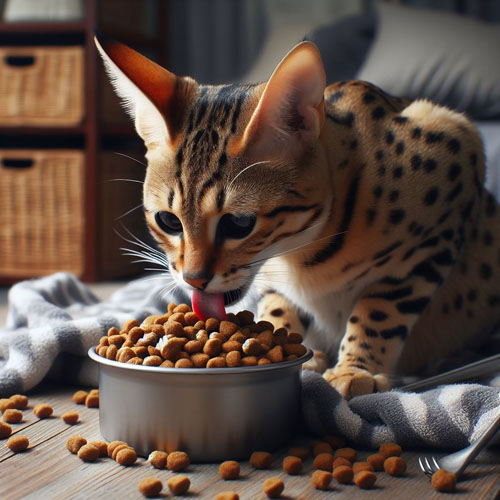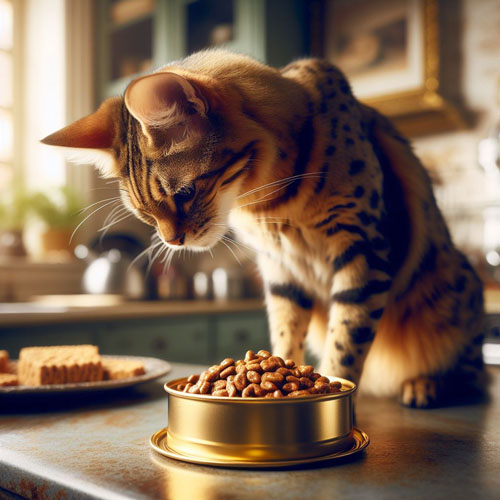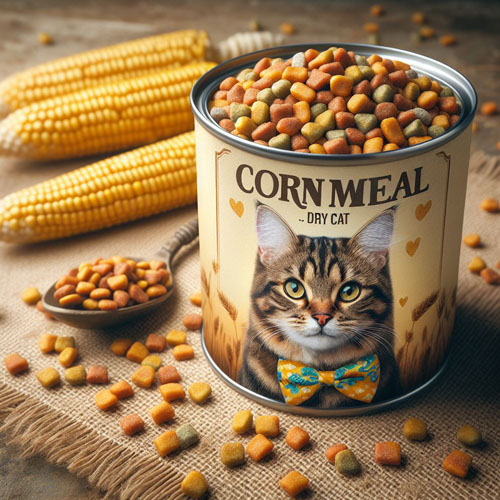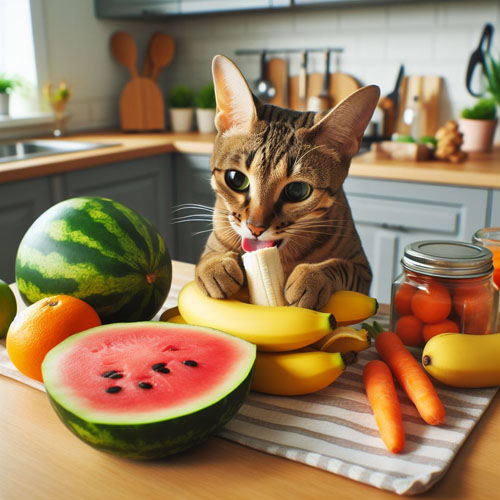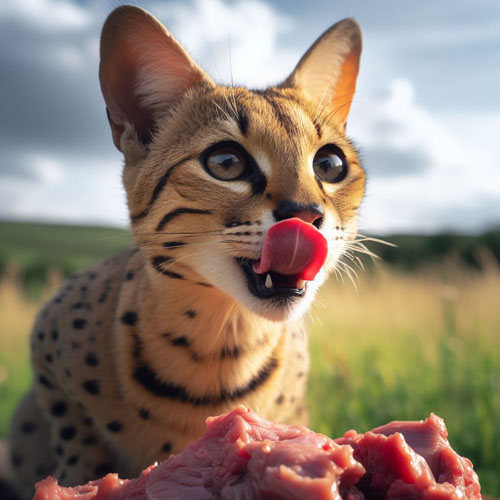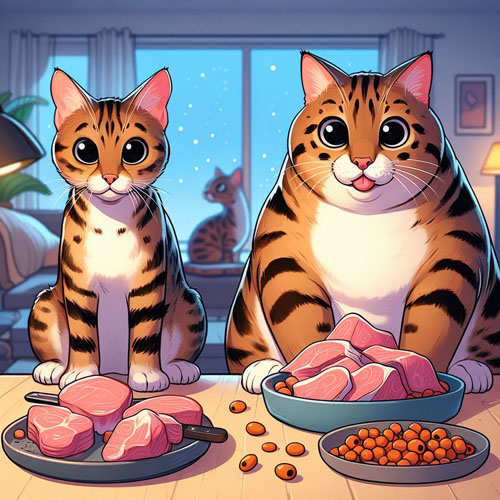What do Savannah cats eat
Vitamins, Supplements, and Nutrition for Savannah Cats: mAs you stroll through any pet store, you will come across a wide variety of cat foods, each claiming to be “complete and balanced” or superior to their competitors. Unfortunately, the truth is that most dry and wet cat foods are lacking in essential nutrients and contain subpar protein. It is advisable to bypass these products and opt for a higher quality food for your Savannah cat, rather than falling for marketing tactics. Remember, good health stems from a nourishing diet, and by providing your cat with the right combination of nutrition and supplements, you can prevent numerous health issues and potentially extend their lifespan. While Savannah cats do require a slightly higher protein intake than regular house-cats, they generally thrive on a top-notch, protein-rich, and low-grain commercial diet. Some breeders suggest adding extra protein to their diets, either cooked or raw, through meats like chicken, beef, or fish.
Feeding Kittens: Feeding an adult Savannah requires a much different approach than feeding a young kitten. When you have a Savannah kitten, you need to pay attention to age.
Feeding a healthy diet is essential to having a healthy cat! It helps them grow, maintain a proper weight, as well as helps keep a pet’s immune system healthy. A poor or improper diet can lead to several health problems. Issues like, diabetes, obesity, vision, kidney and even heart failure. Whether it be humans or animals, higher quality food does means a slightly higher cost, but will save in vet bills in the long run. Healthy pets will live a longer.
Kittens have specific dietary needs to support their growth and development. Here are some key points to consider when feeding a kitten:
- Kitten-specific food: It is recommended to feed kittens specially formulated commercial kitten food. These foods are designed to provide the right balance of nutrients for their growing bodies. Look for products labeled as “kitten” or “growth” formulas.
- Frequent meals: Kittens have smaller stomachs and higher energy requirements, so they need to eat more frequently compared to adult cats. Feed them small meals 3-4 times a day until they are around 6 months old, then gradually transition to a regular feeding schedule.
- High-quality protein: Kittens need a diet rich in high-quality animal protein for proper growth and muscle development. Look for kitten foods that have animal protein sources listed as the main ingredients, such as chicken or turkey.
- Balanced nutrition: Ensure the kitten food provides a balanced blend of protein, fat, and carbohydrates. It should also include essential vitamins and minerals like calcium, phosphorus, and taurine.
- Sufficient hydration: Kittens might not drink water as readily as adult cats, so moisten their dry food with a small amount of water to help keep them hydrated. It’s also advisable to provide a separate shallow dish of fresh water for them to drink from.
- Avoid certain foods: Do not feed kittens with foods that are toxic to cats, such as chocolate, onions, garlic, grapes, and raisins. Also, avoid giving them cow’s milk as it can cause digestive upset. Stick to specially formulated kitten food for their nutritional needs.
Additionally, consult with your veterinarian for personalized advice on feeding your kitten based on their specific breed, age, and health condition.
Adults Savannah Cats: It is crucial to provide a suitable diet for an adult Savannah cat as well as a young kitten, taking into account their unique nutritional requirements. Age plays an important role when determining their feeding approach. A high-quality diet free of by-products and meat meals, that is low in carbohydrates, and does not contain vegetables and grains is recommended. Ensuring that your cat receives a nutritious diet is vital for their overall well-being. It aids in their growth, weight management, and boosts their immune system. A deficient or inappropriate diet can contribute to various health issues such as diabetes, obesity, vision problems, kidney disorders, and even heart failure. Although high-quality food may come at a slightly higher cost, it ultimately saves money on veterinary expenses. By providing a healthy diet, you can extend your pet’s lifespan. When it comes to nourishing a kitten, it is important to cater to their specific dietary needs, which are essential for their growth and development. Take these key factors into consideration while choosing their diet.
- High-Quality Protein: Savannah cats have a high protein requirement to support their active lifestyle and muscle development. Look for cat foods that contain high-quality protein sources like chicken, turkey, or fish as the main ingredients. Aim for at least 30-40% protein content in the cat food.
- Moderate Fat Content: Since Savannah cats tend to be active and energetic, they require a balanced amount of fat in their diet for energy. Look for cat foods with moderate fat levels (around 12-20%) to help ensure they get the necessary energy without excessive weight gain.
- Limited Carbohydrate Content: Cats are obligate carnivores, meaning their bodies are designed to primarily digest and utilize animal-based proteins. Choose cat foods with limited carbohydrate content, as excessive carbs in the diet can lead to weight gain and other health issues. Look for grain-free or low-carbohydrate options.
- Added Taurine: Taurine is an essential amino acid for cats, and a deficiency can lead to serious health problems. Ensure the cat food you choose has added taurine, as it is crucial for maintaining your Savannah cat’s heart health and overall well-being.
- Consult with Your Veterinarian: Each Savannah cat is unique, so it’s always a good idea to consult with your veterinarian for personalized advice. They can take into account your cat’s individual needs, any specific health considerations, and recommend the best adult cat food brands available in your area.
When it comes to choosing the right adult cat food for your Savannah cat, there are a few factors to consider. Savannah cats are known for their active nature and are typically larger in size compared to domestic cats. Here are some guidelines for selecting appropriate cat food:
Remember to transition your cat to a new food gradually and provide fresh water at all times. Regular veterinary check-ups and monitoring your cat’s body condition will also help you ensure they are getting the appropriate nutrition for their specific needs.
Savannah Cat Nutrition Basics: As obligate carnivores, cats require a meat-based diet to maintain their health. Savannah cats have inherited some of their dietary needs from the African Serval. A Savannah cat that does not receive a healthy diet may suffer more than a traditional some health effects more than domesticate short hair cat. While a raw meat diet is the healthiest option, it can be challenging to balance. If you wish to offer a raw meat diet, it is recommended to seek advice from knowledgeable veterinarians and breeders or purchase prepackaged raw meat. Alternatively, choose cat food with meat as the first ingredient and avoid unnecessary carbs like corn, wheat, and rice, which can be harmful if fed in large doses.
Does My Cat Need Vitamins and Supplements: The necessity of vitamins for your Savannah Cat is contingent upon its diet. In the case of a raw diet, it is highly recommended. However, opinions regarding supplementation vary among breeders and veterinarians. Ensuring that a cat receives all necessary nutrients in every meal can be quite challenging. Therefore, it is advisable to err on the side of caution, especially when dealing with higher filial generations that may have more intricate nutritional requirements.
Keywords: Savannah cat diet, Feline nutrition, Cat food recommendations, Raw feeding for cats, Savannah cat health, Balanced cat diet, Cat feeding habits, Nutritional needs of Savannah cats, Best cat food choices, Homemade cat food recipes
